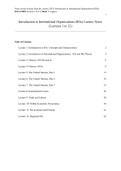Notes on the lectures from the course (2021) Introduction to International Organisations (IIOs).
INCLUDES lectures 1 to 12 (Total: 51 pages).
1
Introduction to International Organisations (IIOs) Lecture Notes
(Lectures 1 to 12)
Table of Contents
Lecture 1: Introduction to IOs: Concepts and Characteristics 2
Lecture 2: Introduction to International Organizations - IOs and IRs Theory 3
Lecture 3: History of IO Research 6
Lecture 4: History of IOs 8
Lecture 5: The United Nations, Part 1 13
Lecture 6: The United Nations, Part 2 16
Lecture 7: The United Nations, Part 3 21
Lecture 8: International Courts 26
Lecture 9: Trade and Labour 30
Lecture 10: Global Economic Governance 36
Lecture 11: Environment and Climate 41
Lecture 12: Regional IOs 45
, 2
Lecture 1: Introduction to IOs: Concepts and Characteristics
1. Why study IOs?
IOs are everywhere (located globally in all regions).
IOs matter (influence all of the world politics’ “issue-areas”).
IOs are controversial (in public and academia).
● Public Debate of IOs
○ “secular Gods” (José Álvarez, 2014): When there are problems, IOs are created to
solve them (turn to them for answers).
○ “Frankenstein monsters” (José Álvarez, 2006): IOs are built up from different parts
and take a “scary” life of their own.
○ “tools of Imperial Internationalism” (Mark Mazower, 2009): To control people and
assert dominance for persuasion.
○ “a club for people to get together, talk and have a good time.” (US President Donald
Trump, 2016): Not very important and used socially.
● Academic Debate
○ Why are they created?
○ Why do they change?
○ Why are they effective?
○ Why do they comply?
2. What are IOs?
IOs: A type of international institution that has norms, rules, practices that shape the behaviour and
expectations of states and other political world actors. It includes:
○ Bureaucracy/headquarters
○ Formal treaty base
○ At least 3 member states
○ Formal rules/procedures
○ Regular state meetings
IGOs vs. NGOs
➔ IGOs: Inter-Governmental Organizations (established by states and can be global - e.g. UN,
IMF - or regional - e.g. EU, OAS).
➔ NGOs: Non-Governmental Organizations (established by non-state actors and can be
profit-oriented - e.g. Apple, Huawei - or advocacy-oriented - e.g. Greenpeace, Amnesty
International).
3. Categorisation of IOs:
Categorised by:
○ Membership: Most are regional, with Europe having the highest density of IOs in the world.
➔ Universal: Every state (e.g. UN).
➔ Limited: Only some states (e.g. EU).
○ Competence
➔ Comprehensive/General Purpose: Deal with many issues/topics (e.g. UN).
➔ Limited/Issue-Specific: Focuses on a specific theme (e.g. WTO).
○ Function
➔ Rule-Making: Make policies (e.g. UN).
➔ Operational: Execute policies (e.g. IAEA).
○ Decision-Making Authority
, 3
➔ Inter-Governmental: Decisions made by member states (“horizontal authority”,
“pooled sovereignty”), e.g. United Nations Security Council (UNSC).
➔ Supranational: Decisions by a body above member states (“vertical authority”,
“delegated sovereignty”), e.g. World Trade Organization.
4. Forces of IOs (Hurd 2018/2020)
Obligation: When states join an IO, they accept the rules/obligations.
➔ Direct Obligations: Explicitly set out (known in advance on a treaty/charter).
➔ Indirect Obligations: Arrive during the IOs course of operation (are open-ended).
Compliance: Is calculated or not calculated.
➔ Explicit Compliance: Directly decide to join an IGO and choose then to either explicitly
comply or violate the IGOs rules (“consent to be bound”).
➔ Implicit Compliance: IGOs influence states’ preferences (through setting goals, understanding
of self-interest and understanding what’s appropriate) leading to eventual compliance with the
rules (“socialisation”).
Enforcement
➔ Direct Enforcement: Ability to threaten and punish rule-violators (but very few IGOs have
this ability; e.g. EU, WTO).
➔ Indirect Enforcement: Ability to persuade or shame ruler-violators (more commonly used by
IGOs). Even in absence of direct enforcement, states often comply as they see more benefit in
agreeing with the IGO, rather than going against it.
5. Roles/Views of IOs (Hurd 2018/2020)
1. Actors
➔ Legal Actors: IGOs are independent entities with a legal personality (sign a treaty
creating a legally constituted body).
➔ Political Actors: Independent actorness (work actively and deliberately) through
social recognition (the ability to do what their constituent part are unable to do on
their own; sometimes exceed/contradict member states), e.g. ICC arrest warrant,
UNSC resolutions.
2. Fora: Used as a physical forum/arena for debate/negotiation between member states,
including the exchange of interests, joint decisions, policy-making and states as relevant
actors (e.g. the UN Security Council: 15 states). Opposite of actors conception; it does not
have a major role, just providing the “infrastructure”.
3. Instruments: IGOs are used to pursue their national interests (especially used by Great
Powers).
Lecture 2: Introduction to International Organizations - IOs and IRs
Theory
The Great Debates:
1. Why do states cooperate (i.e. create and join IOs)?
2. What is the role of IOs in world politics (linked to the roles of IOs)?
Five theoretical strands (mainstream/non-mainstream approaches):
1. (Neo-) Realism:
Basic assumptions:





